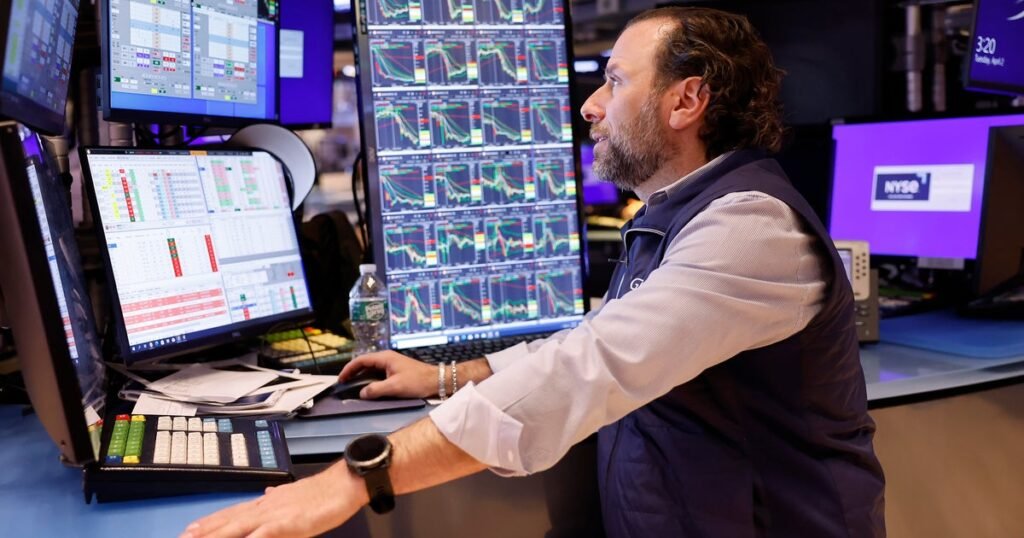Shares within the U.S. look poised for one more bruising day, with futures on main indexes pointing south and following a wave of promoting abroad amid mounting investor fears over the financial fallout from the Trump administration’s barrage of tariffs.
Two hours earlier than markets opened in New York, futures on the S&P 500 had been down 92 factors, or 1.8%. Dow Jones Industrial Common futures, which had fallen roughly 1,250 factors in earlier buying and selling on Monday, pared these losses and had been down 900 factors, or 2.3%, whereas Nasdaq Composite futures had been off 2.1%.
In Asia, Tokyo’s Nikkei 225 index tumbled 7.8%. Hong Kong’s Dangle Seng plunged 13.2% — its steepest drop for the reason that 1997 Asian monetary disaster — and the Shanghai Composite index misplaced 7.3%. In Taiwan, the Taiex fell 9.7%, its heaviest loss on file. South Korea’s Kospi dropped 5.6%, whereas Australia’s S&P/ASX 200 declined 4.2%.
European shares adopted Asian markets downhill. Germany’s DAX index was down 5.8% in morning commerce. Paris’ CAC 40 additionally shed 5.8%, and Britain’s FTSE 100 misplaced 4.9%.
“Sport of hen”
Inventory markets world wide offered off final week after President Trump on April 2 introduced a minimal 10% tariff on all U.S. imports and “reciprocal” levies on practically 90 nations. The worldwide tariff took impact on Saturday, whereas the matching tariffs are set to hit on April 9.
The size of the tariffs has shocked traders, sending U.S. shares into their sharpest decline in 5 years and wiping out trillions in investor wealth. Many economists warn that imposing broad tariffs on items shipped into the U.S. may drive up inflation, chill spending by shoppers and damage financial development.
Retaliating towards the U.S., China mentioned Friday it is going to place a 34% tariff on imports of all U.S. merchandise beginning April 10. Beijing in March additionally began charging a 15% tax on American farm merchandise, together with hen, pork and soy beans.
“China and the U.S. are actually locked in a sport of hen, with the danger of a extreme international commerce conflict looming over monetary markets,” analysts with Pantheon Macroeconomics instructed traders in a word.
The S&P 500 has declined practically 14% since Mr. Trump unveiled the newest tariffs final week, whereas the blue-chip Dow is down 12%. The Nasdaq has decreased practically 16% over that interval, placing the tech-heavy index in a bear market — when shares fall no less than 20% from their most up-to-date excessive.
Highest tariffs since 1909
Since re-entering the White Home in January, Mr. Trump has additionally slapped 25% tariffs on imports from Canada and Mexico, sharply raised import duties on Chinese language items, and put 25% levies on international automobiles, amongst different measures aimed toward U.S. buying and selling companions.
The common U.S. tariff price on imported items is now at its highest degree since 1909, based on the Yale Price range Lab.
Mr. Trump mentioned Sunday that he will not retreat from his tariffs until different nations even out their commerce with the U.S.
Talking to reporters aboard Air Drive One late Sunday, the president mentioned he did not need international markets to fall however that “typically it’s important to take medication to repair one thing.”
Senior Trump administration officers have staunchly defended their commerce insurance policies, saying on Sunday that greater than 50 nations topic to the newest spherical of tariffs have requested talks.
Talking on “Face the Nation” on Sunday, Commerce Secretary Howard Lutnick mentioned the tariffs are “positively going to remain in place for days and weeks. The president must reset international commerce.”
Regardless of final week’s market rout, some Wall Avenue economists anticipate the Trump administration to ease tariffs on sure nations within the months forward in return for his or her reducing commerce boundaries. That will possible assist shore up shares.
“Our assumption is that, over the following few months Trump will make ‘offers’ with many nations, though China would be the exception,” Paul Ashworth, chief North America economist with Capital Economics, mentioned in a analysis word. “As soon as it turns into clear that he’s prepared to simply accept comparatively minor concessions in change for scaling again these tariffs, equities ought to rebound.”
The chance, analysts warn, is that Mr. Trump as a substitute rolls out further tariffs or seeks to punish buying and selling companions that deploy their very own countermeasures.
and
contributed to this report.
